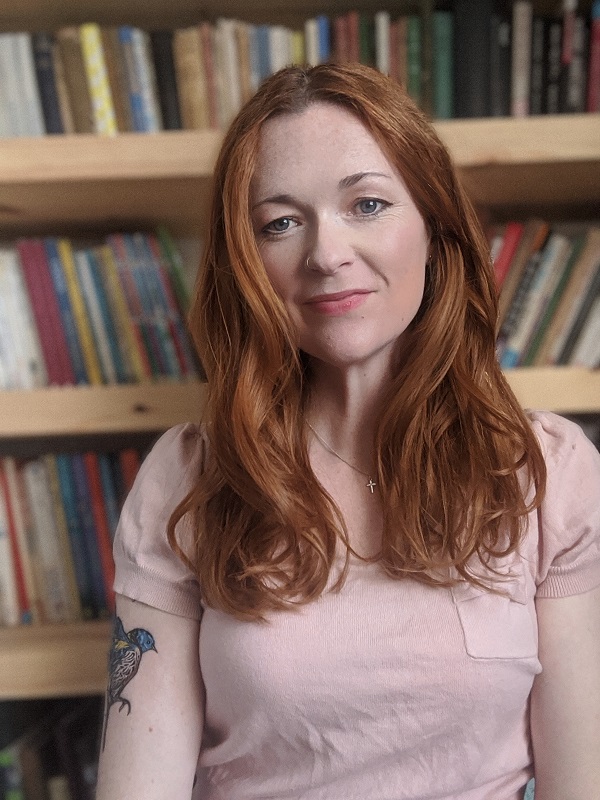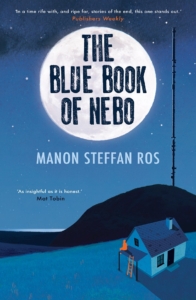
An interview with Manon Steffan Ros, winner of the 2023 Yoto Carnegie Medal for Writing
This year’s Yoto Carnegie Medal for Writing has been awarded to Manon Steffan Ros for The Blue Book of Nebo. Translated from the Welsh, this is an unusual book with a vivid sense of location and a post-apocalyptic setting that makes the reader wonder about the nature of life, the importance of cultural heritage through language and narratives that can hide and reveal. At its heart is a bond between a mother and son who struggle to survive and adapt in the vicissitudes of a cruel world. Tanja Jennings, one of the judges on this year’s Carnegie panel, interviewed Manon for Books for Keeps.
 Welcome Manon. Congratulations on winning the Carnegie Medal for Writing.
Welcome Manon. Congratulations on winning the Carnegie Medal for Writing.
Did any post-apocalyptic writers inspire the theme of your novel?
Not the theme so much – that came from a very deep and very old fear I have always carried about having to face disaster and apocalypse. But I think that John Wyndham has definitely been an inspiration stylistically – he writes sci-fi which was completely centred in the characters, and so his books feel warm, real and alive.
How long was it in the planning and translation?
The original Welsh, Llyfr Glas Nebo, was written in 2017, and it took about 3 weeks to write. I know that it’s a very short time, but these themes and characters had been in my mind for decades! I translated the book just for my own enjoyment – I really love creative translation. I didn’t expect the English version to be published!
There’s a beautiful sense of place in your novel. Which locations inspired you?
I am very lucky to have been born and raised in Eryri, north Wales, surrounded by mountains and ocean. Everywhere you look is green and lovely. One of the reasons I love the small village of Nebo is that it nestles deep within this grand landscape.
What decided you on the structure – the dual stories that hide and reveal?
I never plan anything I write – I get bored if I plan ahead- and so the structure wasn’t really a conscious decision I made when I was writing, it just seemed to make more sense to me at the time. I’m glad I wrote dual narrators – we as readers have to decide on which version is closest to reality.
What is most important to you and why – symbolism, character or plot?
Character, always. I never plot anything, and when I start writing, I don’t know what happens in the middle, never mind the end! But I spend a lot of time thinking about my characters before I write down a single word. I think about small, random things like what do their hands look like; how they like their coffee; what does their laugh sound like.
You deal with some hard-hitting themes. Which scene was the most difficult to write?
I won’t give any spoilers but there’s a really upsetting scene towards the end that made me feel incredibly guilty for writing it. I don’t hold back on themes, but I do feel bad for what I put the characters through.
Dylan is extremely resourceful. Did you research survival techniques?
No. I was trying to put myself in his position and think about what it would be like to try and survive when you’ve had no experience or training. I trusted Dylan’s character to get it right!
You refer to a number of important Welsh literary texts weaving them into the intertextuality of the narrative. Can you explain their significance?
My first language is Welsh, and it’s the language I speak with my children. I don’t think that people outside the Welsh speaking community know about the lively, varied, exciting culture we have! I read Welsh books and listen to Welsh music and watch Welsh TV and enjoy Welsh radio and podcasts. It’s fantastic! So writing about our culture in this way felt completely natural to me – it’s how I live my life.
Did you have a different ending in mind?
I didn’t know what the ending was going to be until I wrote it! I can never work out whether the ending is happy or sad – the readers are split on that one!
What message would you like young people to take away from The Blue of Nebo?
I try not to write with any particular message in mind – I just write the story that’s in my head and readers can interpret it however they want to. Having said that, if this book makes people more aware of Welsh language culture, and perhaps more open to reading more books in translation, then that will make me very happy indeed!
The Blue of Nebo is published by Firefly Press, 978-1913102784, £8.99 pbk.





